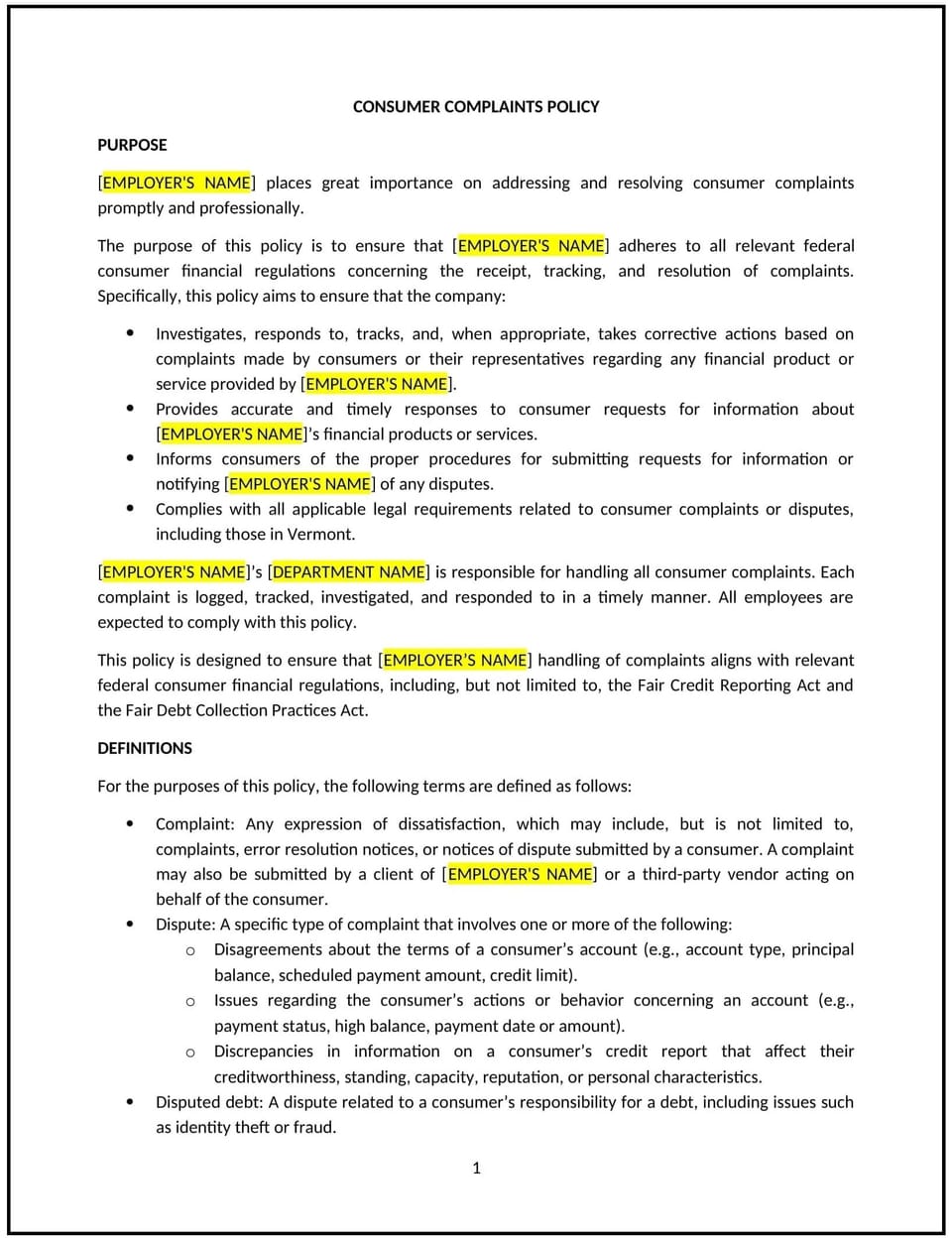Consumer complaints policy (Vermont): Free template

Consumer complaints policy (Vermont)
This consumer complaints policy is designed to help Vermont businesses handle customer complaints effectively and fairly. It provides guidelines for receiving, addressing, and resolving consumer concerns while promoting compliance with Vermont laws and promoting customer satisfaction.
By adopting this policy, businesses can enhance customer relationships, build trust, and maintain a positive reputation.
How to use this consumer complaints policy (Vermont)
- Define complaints: Clarify what constitutes a consumer complaint, such as dissatisfaction with a product, service, or company policy.
- Establish submission procedures: Provide clear instructions for consumers to submit complaints, including contact methods such as phone, email, or online forms.
- Set response timelines: Outline the expected timeframe for acknowledging and resolving complaints to manage consumer expectations.
- Include investigation processes: Detail how complaints will be investigated, including gathering information and involving relevant departments.
- Provide resolution options: Explain possible outcomes, such as refunds, replacements, or adjustments, based on the nature of the complaint.
- Emphasize recordkeeping: Require documentation of complaints, investigations, and resolutions to ensure accountability and improve future practices.
- Monitor compliance: Regularly review complaint handling procedures to ensure alignment with Vermont consumer protection laws.
Benefits of using this consumer complaints policy (Vermont)
This policy provides several benefits for Vermont businesses:
- Enhances customer satisfaction: Resolves consumer concerns promptly and professionally.
- Builds trust: Demonstrates a commitment to addressing customer feedback and improving services.
- Promotes compliance: Aligns with Vermont consumer protection laws and industry regulations.
- Supports continuous improvement: Provides insights for refining products, services, and processes based on consumer feedback.
- Protects reputation: Reduces the risk of negative publicity by addressing complaints effectively.
Tips for using this consumer complaints policy (Vermont)
- Communicate the policy: Display the complaint submission process on your website, in-store, or in product materials.
- Train employees: Ensure staff understand their roles in managing and resolving consumer complaints.
- Encourage feedback: Create a welcoming environment where consumers feel comfortable sharing concerns.
- Track trends: Analyze complaint data to identify recurring issues and implement corrective actions.
- Update regularly: Revise the policy to reflect changes in Vermont laws, customer expectations, or business practices.
Q: What is considered a consumer complaint under this policy?
A: A consumer complaint includes any dissatisfaction or concern about a product, service, or company policy reported by a customer.
Q: How can customers submit complaints?
A: Customers can submit complaints through various channels, such as phone, email, or an online form, as outlined in this policy.
Q: How long does it take to resolve a complaint?
A: The company aims to acknowledge complaints within [insert timeframe] and resolve them within [insert timeframe], depending on the complexity of the issue.
Q: What happens after a complaint is submitted?
A: The company will investigate the complaint, gather relevant information, and work with the appropriate department to reach a resolution.
Q: Are refunds or replacements provided for complaints?
A: Refunds, replacements, or other resolutions may be offered based on the nature of the complaint and the company’s policies.
Q: How are complaints documented?
A: All complaints, investigations, and resolutions are recorded to ensure transparency and identify areas for improvement.
Q: How often is this policy reviewed?
A: This policy is reviewed annually or whenever significant changes occur in Vermont consumer protection laws or business practices.
Q: Can complaints be submitted anonymously?
A: Anonymous complaints may be accepted, but providing contact information allows the company to address the issue more effectively.
This article contains general legal information and does not contain legal advice. Cobrief is not a law firm or a substitute for an attorney or law firm. The law is complex and changes often. For legal advice, please ask a lawyer.


